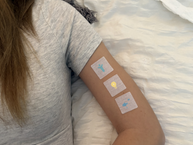It may come as a surprise to learn that nutrient deficiencies are quite common in America, with about 1 in 10 Americans suffering from at least one deficiency. One could ask whether they have a deficiency, in which vitamins they might lack, and how such deficiencies can be averted. This article outlines the most frequently encountered vitamin deficiencies in America, ways to detect if you have them, and preventive measures, including deciding on the appropriate PatchAid Vitamin Patches together with your healthcare provider.
Tackling Vitamin D Deficiency
Approximately 8% of the US population struggles with a deficiency in Vitamin D which is synthesized by the body under the influence of sunlight. The deficiency prevalence varies among races with white Americans showing lower percentages and Black Americans indicating more than 30%.
Vitamin D can also be obtained from a few foods such as fortified milk, certain dairy substitutes like almond and soy milk, fortified foods like Vitamin D-fortified orange juice and breakfast cereals, fatty fish, and egg yolks.
Groups at a higher risk for Vitamin D deficiency include:
- People who always use sunscreen
- People who protect their skin from the sun
- Bariatric surgery patients
- Overweight and obese adults
- Residents of northern climates
- Older adults
Taking Vitamin D3 Patches from PatchAid can supplement Vitamin D3, thereby supporting bone strength, heart, and brain health, promoting normal glucose metabolism, and immune functions.
The Importance of B Vitamins
B vitamins are imperative for normal energy metabolism, formation of healthy red blood cells, heart health, brain health, mood regulation, and prevention of birth defects during embryonic growth.
A diverse array of B vitamins can be found in many foods such as vegetables (especially green vegetables), potatoes, fish, seafood, meat, poultry, dairy products, beans, peas, lentils, fortified cereals and flour, and nuts and seeds.
Groups at higher risk for B vitamin deficiency include older adults, bariatric surgery patients, pregnant or breastfeeding women, people who misuse alcohol, and those who follow a vegan diet.
Iron Deficiency: A Global Issue
Iron deficiency, the most common mineral deficiency worldwide, is also prevalent in the US, with about 1 in 10 individuals suffering. Iron-rich foods like meat, poultry, fish, seafood, egg yolks, dairy products, green vegetables, potatoes, raisins, beans, lentils, and fortified grains can help combat this deficiency.
Groups at higher risk for iron deficiency include women of child-bearing age, those pregnant or breastfeeding, children and adolescents, serious athletes, people with colitis or IBD, bariatric surgery patients, and those following a vegan diet.
The Role of Multivitamins
You don't need to have a deficiency to consider taking a daily multivitamin supplement. A daily multivitamin can contain a wide range of essential vitamins and minerals, meeting your needs even if your diet doesn't.
The Multivitamin Plus Patch by PatchAid includes iodine along with 26 other essential vitamins and minerals that may not be adequately supplied by your daily diet.
Vitamin deficiencies may be more common than you think, but with a healthy diet and the right vitamin patches recommended by your healthcare provider, these can be effectively combated. Explore the options available from PatchAid to determine which ones suit you best.
Please consult with a healthcare professional before starting any diet, exercise or supplementation program. The statements on this site have not been evaluated by the FDA. Our products are not intended to diagnose, treat, cure, or prevent any disease.







